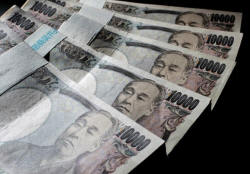|
Yen gains, ruble tumbles
after U.S. missile strike on Syria
 Send a link to a friend
Send a link to a friend
 [April 07, 2017]
By Jemima Kelly [April 07, 2017]
By Jemima Kelly
LONDON
(Reuters) - The safe-haven yen climbed against the dollar and euro on
Friday and the ruble tumbled, after the United States launched cruise
missiles at an airbase in Syria, raising tensions with Russia.
In the biggest foreign policy decision of his presidency so far, Donald
Trump ordered the move after a chemical weapons attack killed at least
70 people this week. It catapulted the United States into a
confrontation with Russia, which has military advisers on the ground
assisting the Syrian government.
The ruble skidded around 1 percent <RUB=>, putting it on course for its
biggest one-day falls in a month.
The yen, which investors tend to flock to when they perceive an increase
in political or financial risk, strengthened to an 11-day high of
110.135 to the dollar <JPY=> in Asian trading, in the immediate
aftermath of Trump's announcement.
By 1115 GMT, though, it was up just 0.1 percent on the day at 110.68 yen
per dollar. Stocks also recovered from earlier losses.
The dollar index, which gauges the greenback against a basket of six
major rivals, inched up 0.2 percent to 100.84, close to a three-week
high. <.DXY>

"Asset markets have taken Washington's air-strike against Syria in their
stride, at this stage viewing it as an isolated response to the horrific
use of chemical weapons," said ING's head of currency strategy in
London, Chris Turner.
"Only if the Trump administration started to look at far more
comprehensive foreign policy action, requiring Congressional approval,
might the dollar sell off more."
A weekly U.S. labor market report, due at 1230 GMT, is expected to show
an increase of 180,000 jobs in March, according to economists polled by
Reuters. That could reinforce expectation the Federal Reserve will
deliver two more interest rate increases this calendar year. [ECONUS]
[to top of second column] |

Illustrative picture shows Japanese 10,000 yen bank notes spread out
at an office of World Currency Shop in Tokyo in this August 9, 2010
illustrative picture. REUTERS/Yuriko Nakao/File Photo

But UBS Wealth Management's head of currency strategy, Constantin Bolz,
said the labor market data was at the moment less important to the Fed's
considerations on monetary policy than inflation data and global
financial market pressures.
"The US labor market is fine – it doesn’t really matter if payrolls come
in 10,000 or 15,000 higher or lower," he said.
The euro added to losses the previous day on the back of dovish comments
from the European Central Bank chief, who said he saw no reason to
deviate from the ECB's policy path, which includes sub-zero interest
rates and bond-buying until at least the euro of the year.
The single currency hit a three-week low of $1.0626, and earlier hit a 4
1/2-month low against the yen.
The U.S. air strike came during a two-day summit between Trump and
Chinese President Xi Jinping, and will add a new dimension to their
talks.
The meeting had a strong focus on trade and North Korea's military
program. Trump had warned that he would be ready to act unilaterally to
address North Korea's nuclear program if China does not step up to help
in the matter.
(Additional reporting by Marc Jones in London and markets team in Tokyo;
editing by Andrew Roche)
[© 2017 Thomson Reuters. All rights
reserved.] Copyright 2017 Reuters. All rights reserved. This material may not be published,
broadcast, rewritten or redistributed. |